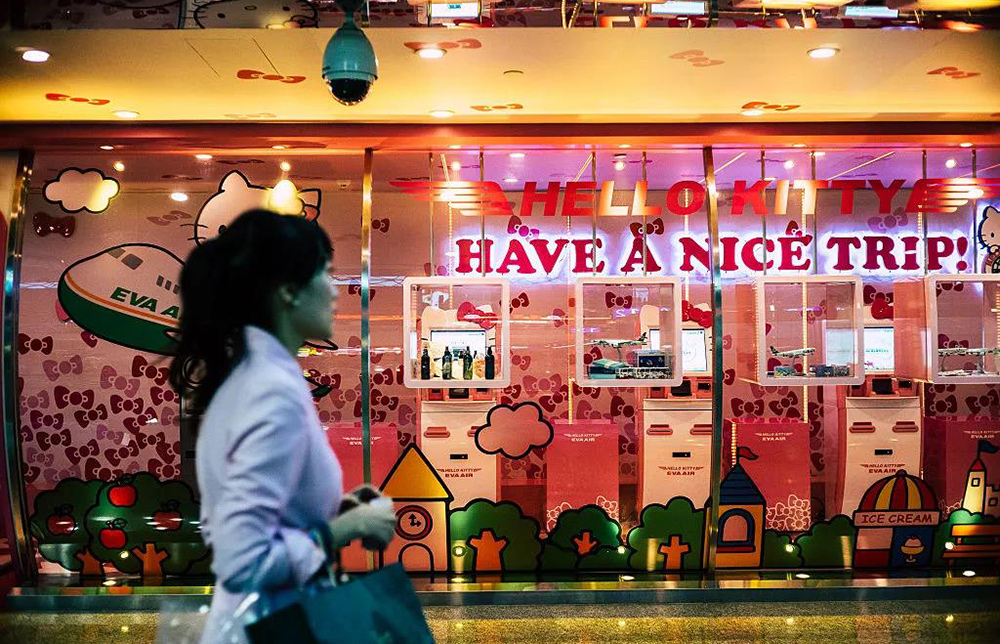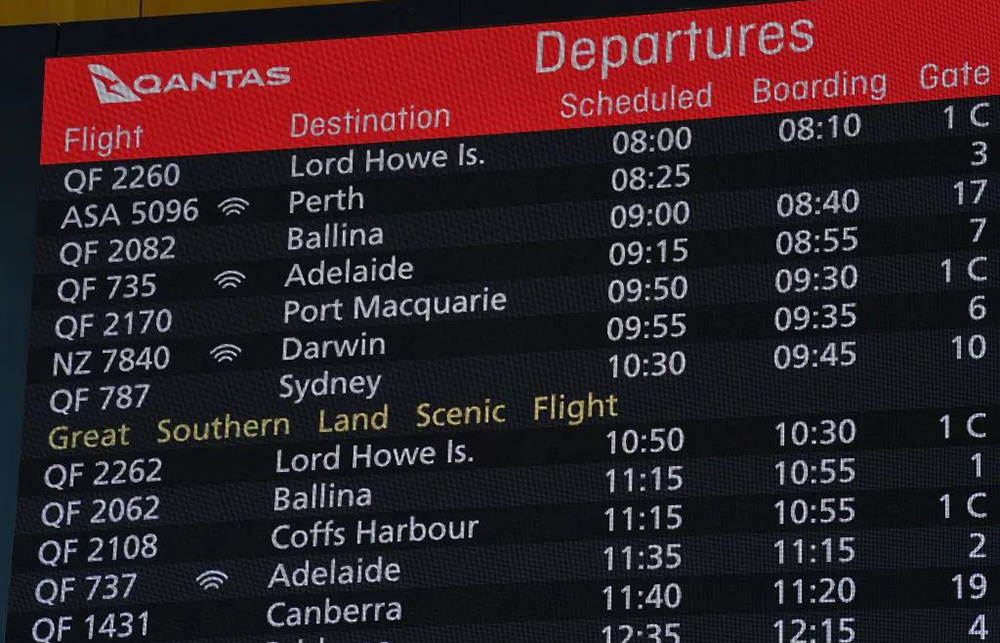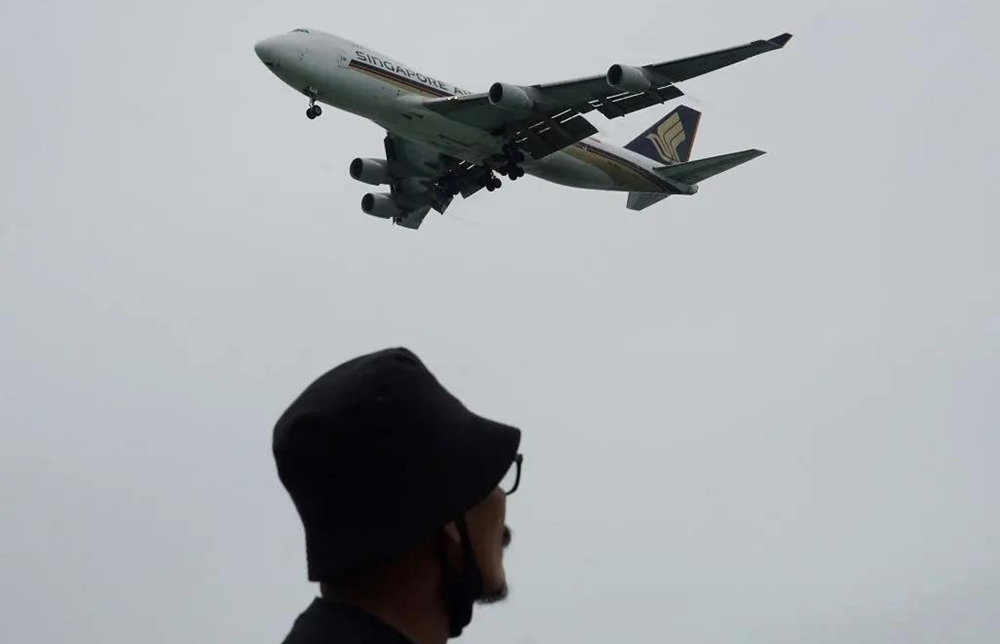在10月的前三天里,數(shù)百名中國臺灣的旅客從桃園國際機場登機,開始了他們的長途旅行。他們的航程沒有目的地,飛機繞了一大圈之后,將在起飛的地方降落。
這些乘客搭乘的就是所謂的“無目的地航班”。起飛后,航班將帶著他們在夜間環(huán)繞臺灣主島飛行一圈。
這次飛行恰逢中秋節(jié),飛行員會將飛機稍加傾斜,讓乘客可以清楚地看到滿月。空姐還向乘客提供了傳統(tǒng)的節(jié)日佳肴:月餅。
三個小時后,飛機再次降落在桃園機場。在疫情之下,這樣的旅程就算是一次度假了。
受疫情沖擊,航空業(yè)受損尤為嚴重。航空公司為了擴大銷量已經(jīng)使出了渾身解數(shù),無目的地航班也是其中的一種嘗試。
大部分亞洲地區(qū)已經(jīng)控制住了疫情,但由于各國邊境關(guān)閉和檢疫要求,人們對于航空公司的需求仍然在下降,很多航班也仍然基本處于停飛狀態(tài)。“無目的地飛行”的新花樣成功地吸引了渴望出行的乘客們。
專家說,這種新式旅行滿足了那些曾經(jīng)經(jīng)常乘坐飛機的人對于回歸常態(tài)的渴望,并給了他們一種逃離當(dāng)下的感覺。
但關(guān)注氣候變化的專家則譴責(zé)道,這種“回旋鏢”式的航班給環(huán)境帶來了不必要的損害,同時,從結(jié)果來看,這種方式也并不是航空公司的出路。
沒有目的地的航班
今年8月,臺灣長榮航空推出了“Hello Kitty”主題的飛機,向人們傳達了“無目的地飛行”的概念,這架日間航班會繞著臺灣地區(qū)的海岸線和日本的琉球群島飛行一圈。
這架航班的首航是在臺灣地區(qū)的父親節(jié)那一天進行的,航空公司也因此將該航班的編號定為5288——這串?dāng)?shù)字是“我愛爸爸”的諧音。
從那以后,亞太地區(qū)的航空公司——文萊、日本、中國香港和澳大利亞——都開始提供這種無目的地航班。航空公司表示,這種旅行方式很受歡迎。
長榮航空公司稱,中秋假期三天的航班全部售罄。
9月,澳大利亞的澳洲航空公司表示,他們推出的“無目的地航班”將進行長達7小時的飛行,繞著澳大利亞的黃金海岸和內(nèi)陸荒野巡游,機上座位在10分鐘內(nèi)就被搶購一空。
旅客為什么會選擇這種旅行方式呢?
畢竟這看起來真的是在花錢找罪受——狹窄的機艙空間、平庸的食物、與陌生人近距離接觸,以及感染病毒的風(fēng)險,同時又享受不到降落到新目的地的感受。

一位乘坐這次以中秋為主題的無目的地航班的乘客告訴《海峽時報》記者,在往年假期中,他們?nèi)叶紩黄鸪鼍陈眯校衲暧捎谝咔樵颍x擇了這趟航班作為替代。
“我們太想出國旅游了。”該名乘客說道,“上一次出去,還是去年10月。那時候我們?nèi)乙黄鹑チ巳毡颈焙5馈!?/font>
正如澳洲航空公司的首席執(zhí)行官艾倫·喬伊斯接受《紐約時報》采訪時說的那句話:“乘客們只是單純地懷念他們在空中的飛行體驗。”
喬伊斯表示:“很多常客在之前已經(jīng)習(xí)慣了一周一次的乘機頻率,他們一直對我們說,很懷念那些坐飛機的日子,就像懷念旅行的目的地本身一樣。”
香港大學(xué)的旅游研究教授本杰明·拉昆托對此表示贊同。
“至少對那些有一定經(jīng)濟能力的人來說,定期乘飛機旅行已經(jīng)成為一種習(xí)慣。”拉昆托強調(diào):“飛行是一件自然而然的事情,就像我們的日常生活一樣。”
如此一來,在如今疫情下的“減飛”時期,哪怕是普通而簡單的飛行也會變得不尋常起來。
“當(dāng)你在機場的時候,即使機場真的空曠而無聊,但還是有一些令人興奮的東西。”拉昆托指出:“機場是一個非常普通的地方,但乘客坐在那里,就會萌發(fā)一種期待感。”
香港理工大學(xué)的心理學(xué)及旅游業(yè)交叉學(xué)科教授塞巴斯蒂·菲利普認為,旅行沖動是由一種與生俱來的“逃離欲望”所推動的,而疫情期間的隔離需求又再次加劇了這種沖動。

菲利普表示,對許多旅行者來說,目的地本身并不總是最重要的。
“重要的不是去哪里,而是和誰一起去。”菲利普說道。“越來越多的證據(jù)表明,旅行能夠帶來巨大的幸福感,既可以解壓,又有利于改善心血管健康。”
考慮到“無目的地航班”才剛剛開始起步,目前很難判斷它到底能夠給乘客帶來多少不同于常規(guī)航班的好處。
“這是一次試驗。”菲利普補充道。
不起飛的航班
事實上,現(xiàn)在除了“無目的地航班”,還有航空公司做得更絕:推出“不起飛航班”。
9月19日,新加坡航空公司宣布推出一套全新的“乘機體驗”活動。
報名乘客可以享受到一次虛擬航行體驗,空乘人員會為他們準備飛機餐,飛行員也會像真實航班那樣,出來與乘客見面。孩子們甚至能夠自由換裝,感受一把當(dāng)“小空姐”的感覺。
“疫情大大減少了我司正在運營的航班數(shù)量,在這段特殊的時間,我們決定開展一些創(chuàng)意活動,來與我們的客戶或是粉絲進行互動。”新加坡航空公司的首席執(zhí)行官吳俊鵬在一份聲明中表示。
新加坡航空在聲明中稱,他們也曾經(jīng)考慮過開設(shè)“無目的地航班”,但由于當(dāng)?shù)貧夂颦h(huán)保人士的強烈反對,最終還是選擇了這樣一種“不起飛航班”。

SG Climate Rally是一個旨在2050年前在新加坡實現(xiàn)碳中和的組織。該組織對新加坡航空公司考慮開設(shè)無目的地航班的計劃表示反對。該組織寫道,這些航班“鼓勵無意義的碳密集旅行”。
同樣,澳大利亞、英國等地的氣候活動人士也表達了類似的擔(dān)憂。他們擔(dān)心,這種單純?yōu)榱孙w行體驗而開設(shè)的航班會對環(huán)境造成影響。
“我個人認為,這是一場環(huán)境災(zāi)難。”拉昆托說,“如果你是可持續(xù)發(fā)展旅游業(yè)的從業(yè)者,你絕對會為這件事情感到沮喪——因為你知道,交通占據(jù)了旅游業(yè)碳排放的絕大部分。”
對于支持可持續(xù)性旅游行業(yè)的人來說,無目的地航班的流行并不是一個好跡象。
“旅游泡泡計劃”
無論無目的地航班多么成功,都無法彌補航空公司慘淡的銷售業(yè)績。
截至目前,各大航空公司只提供有限的無目的地航班,對它們的資產(chǎn)負債影響不大,甚至微乎其微。
香港快運將于11月推出三班此類航班,起價50美元;長榮航空的中秋三天航班,價格在200美元至300美元之間;而澳航的一天航班價格則在566美元至2734美元之間。
10月6日,國際航空運輸協(xié)會表示,預(yù)計全球航空公司將在2020年下半年耗損770億美元成本。該組織警告說,航空業(yè)有500萬人面臨失業(yè)危險。
新加坡航空公司公布了其2020年上半年超過10億美元的虧損,又于近期裁員4300人。在澳洲航空8月公布的季度財報顯示,其虧損近20億美元。同一時間段內(nèi),長榮航空虧損逾2000萬美元。
對亞洲的航空公司來說,跨境航班的恢復(fù)多少是個安慰。
自今年5月以來,亞洲各國的相關(guān)管理者一直在討論“旅游泡泡計劃”的概念,即疫情形勢緩和的國家相互開放旅游線路,并取消對對方游客的隔離要求。
但是,到目前為止,這些想法都沒有付諸實踐。
不過有跡象表明,有關(guān)“旅游泡泡計劃”的討論再次升溫。
據(jù)報道,新加坡和中國香港正朝著建立雙向飛行走廊的目標(biāo)邁進;泰國則于最近宣布將于10月底開始接納中國游客;韓國和日本宣布,兩國將開始引入跨境、無隔離的商務(wù)旅行。
目前對一些旅行者來說,無目的地航班可能還不太受歡迎。
但即便如此,從航空公司角度來看,這類航班也是之前傳統(tǒng)航班的重要替代。(財富中文網(wǎng))
編譯:陳聰聰、陳怡軒、楊二一
編輯:徐曉彤
在10月的前三天里,數(shù)百名中國臺灣的旅客從桃園國際機場登機,開始了他們的長途旅行。他們的航程沒有目的地,飛機繞了一大圈之后,將在起飛的地方降落。
這些乘客搭乘的就是所謂的“無目的地航班”。起飛后,航班將帶著他們在夜間環(huán)繞臺灣主島飛行一圈。
這次飛行恰逢中秋節(jié),飛行員會將飛機稍加傾斜,讓乘客可以清楚地看到滿月。空姐還向乘客提供了傳統(tǒng)的節(jié)日佳肴:月餅。
三個小時后,飛機再次降落在桃園機場。在疫情之下,這樣的旅程就算是一次度假了。
受疫情沖擊,航空業(yè)受損尤為嚴重。航空公司為了擴大銷量已經(jīng)使出了渾身解數(shù),無目的地航班也是其中的一種嘗試。
大部分亞洲地區(qū)已經(jīng)控制住了疫情,但由于各國邊境關(guān)閉和檢疫要求,人們對于航空公司的需求仍然在下降,很多航班也仍然基本處于停飛狀態(tài)。“無目的地飛行”的新花樣成功地吸引了渴望出行的乘客們。
專家說,這種新式旅行滿足了那些曾經(jīng)經(jīng)常乘坐飛機的人對于回歸常態(tài)的渴望,并給了他們一種逃離當(dāng)下的感覺。
但關(guān)注氣候變化的專家則譴責(zé)道,這種“回旋鏢”式的航班給環(huán)境帶來了不必要的損害,同時,從結(jié)果來看,這種方式也并不是航空公司的出路。
沒有目的地的航班
今年8月,臺灣長榮航空推出了“Hello Kitty”主題的飛機,向人們傳達了“無目的地飛行”的概念,這架日間航班會繞著臺灣地區(qū)的海岸線和日本的琉球群島飛行一圈。
這架航班的首航是在臺灣地區(qū)的父親節(jié)那一天進行的,航空公司也因此將該航班的編號定為5288——這串?dāng)?shù)字是“我愛爸爸”的諧音。
從那以后,亞太地區(qū)的航空公司——文萊、日本、中國香港和澳大利亞——都開始提供這種無目的地航班。航空公司表示,這種旅行方式很受歡迎。
長榮航空公司稱,中秋假期三天的航班全部售罄。
9月,澳大利亞的澳洲航空公司表示,他們推出的“無目的地航班”將進行長達7小時的飛行,繞著澳大利亞的黃金海岸和內(nèi)陸荒野巡游,機上座位在10分鐘內(nèi)就被搶購一空。
旅客為什么會選擇這種旅行方式呢?
畢竟這看起來真的是在花錢找罪受——狹窄的機艙空間、平庸的食物、與陌生人近距離接觸,以及感染病毒的風(fēng)險,同時又享受不到降落到新目的地的感受。
一位乘坐這次以中秋為主題的無目的地航班的乘客告訴《海峽時報》記者,在往年假期中,他們?nèi)叶紩黄鸪鼍陈眯校衲暧捎谝咔樵颍x擇了這趟航班作為替代。
“我們太想出國旅游了。”該名乘客說道,“上一次出去,還是去年10月。那時候我們?nèi)乙黄鹑チ巳毡颈焙5馈!?/p>
正如澳洲航空公司的首席執(zhí)行官艾倫·喬伊斯接受《紐約時報》采訪時說的那句話:“乘客們只是單純地懷念他們在空中的飛行體驗。”
喬伊斯表示:“很多常客在之前已經(jīng)習(xí)慣了一周一次的乘機頻率,他們一直對我們說,很懷念那些坐飛機的日子,就像懷念旅行的目的地本身一樣。”
香港大學(xué)的旅游研究教授本杰明·拉昆托對此表示贊同。
“至少對那些有一定經(jīng)濟能力的人來說,定期乘飛機旅行已經(jīng)成為一種習(xí)慣。”拉昆托強調(diào):“飛行是一件自然而然的事情,就像我們的日常生活一樣。”
如此一來,在如今疫情下的“減飛”時期,哪怕是普通而簡單的飛行也會變得不尋常起來。
“當(dāng)你在機場的時候,即使機場真的空曠而無聊,但還是有一些令人興奮的東西。”拉昆托指出:“機場是一個非常普通的地方,但乘客坐在那里,就會萌發(fā)一種期待感。”
香港理工大學(xué)的心理學(xué)及旅游業(yè)交叉學(xué)科教授塞巴斯蒂·菲利普認為,旅行沖動是由一種與生俱來的“逃離欲望”所推動的,而疫情期間的隔離需求又再次加劇了這種沖動。
菲利普表示,對許多旅行者來說,目的地本身并不總是最重要的。
“重要的不是去哪里,而是和誰一起去。”菲利普說道。“越來越多的證據(jù)表明,旅行能夠帶來巨大的幸福感,既可以解壓,又有利于改善心血管健康。”
考慮到“無目的地航班”才剛剛開始起步,目前很難判斷它到底能夠給乘客帶來多少不同于常規(guī)航班的好處。
“這是一次試驗。”菲利普補充道。
不起飛的航班
事實上,現(xiàn)在除了“無目的地航班”,還有航空公司做得更絕:推出“不起飛航班”。
9月19日,新加坡航空公司宣布推出一套全新的“乘機體驗”活動。
報名乘客可以享受到一次虛擬航行體驗,空乘人員會為他們準備飛機餐,飛行員也會像真實航班那樣,出來與乘客見面。孩子們甚至能夠自由換裝,感受一把當(dāng)“小空姐”的感覺。
“疫情大大減少了我司正在運營的航班數(shù)量,在這段特殊的時間,我們決定開展一些創(chuàng)意活動,來與我們的客戶或是粉絲進行互動。”新加坡航空公司的首席執(zhí)行官吳俊鵬在一份聲明中表示。
新加坡航空在聲明中稱,他們也曾經(jīng)考慮過開設(shè)“無目的地航班”,但由于當(dāng)?shù)貧夂颦h(huán)保人士的強烈反對,最終還是選擇了這樣一種“不起飛航班”。
SG Climate Rally是一個旨在2050年前在新加坡實現(xiàn)碳中和的組織。該組織對新加坡航空公司考慮開設(shè)無目的地航班的計劃表示反對。該組織寫道,這些航班“鼓勵無意義的碳密集旅行”。
同樣,澳大利亞、英國等地的氣候活動人士也表達了類似的擔(dān)憂。他們擔(dān)心,這種單純?yōu)榱孙w行體驗而開設(shè)的航班會對環(huán)境造成影響。
“我個人認為,這是一場環(huán)境災(zāi)難。”拉昆托說,“如果你是可持續(xù)發(fā)展旅游業(yè)的從業(yè)者,你絕對會為這件事情感到沮喪——因為你知道,交通占據(jù)了旅游業(yè)碳排放的絕大部分。”
對于支持可持續(xù)性旅游行業(yè)的人來說,無目的地航班的流行并不是一個好跡象。
“旅游泡泡計劃”
無論無目的地航班多么成功,都無法彌補航空公司慘淡的銷售業(yè)績。
截至目前,各大航空公司只提供有限的無目的地航班,對它們的資產(chǎn)負債影響不大,甚至微乎其微。
香港快運將于11月推出三班此類航班,起價50美元;長榮航空的中秋三天航班,價格在200美元至300美元之間;而澳航的一天航班價格則在566美元至2734美元之間。
10月6日,國際航空運輸協(xié)會表示,預(yù)計全球航空公司將在2020年下半年耗損770億美元成本。該組織警告說,航空業(yè)有500萬人面臨失業(yè)危險。
新加坡航空公司公布了其2020年上半年超過10億美元的虧損,又于近期裁員4300人。在澳洲航空8月公布的季度財報顯示,其虧損近20億美元。同一時間段內(nèi),長榮航空虧損逾2000萬美元。
對亞洲的航空公司來說,跨境航班的恢復(fù)多少是個安慰。
自今年5月以來,亞洲各國的相關(guān)管理者一直在討論“旅游泡泡計劃”的概念,即疫情形勢緩和的國家相互開放旅游線路,并取消對對方游客的隔離要求。
但是,到目前為止,這些想法都沒有付諸實踐。
不過有跡象表明,有關(guān)“旅游泡泡計劃”的討論再次升溫。
據(jù)報道,新加坡和中國香港正朝著建立雙向飛行走廊的目標(biāo)邁進;泰國則于最近宣布將于10月底開始接納中國游客;韓國和日本宣布,兩國將開始引入跨境、無隔離的商務(wù)旅行。
目前對一些旅行者來說,無目的地航班可能還不太受歡迎。
但即便如此,從航空公司角度來看,這類航班也是之前傳統(tǒng)航班的重要替代。(財富中文網(wǎng))
編譯:陳聰聰、陳怡軒、楊二一
編輯:徐曉彤
On three days in early October, hundreds of Taiwanese travelers boarded packed Eva Air flights at Taoyuan International Airport. They were not bound for an international or even regional destination; instead, the flight would end exactly where it started. The passengers were set to depart on a so-called flight to nowhere, which would take them on a night-time loop around Taiwan's main island.
The flights coincided with the Asian holiday of Mid-Autumn Festival, and pilots tilted the planes to give fliers clear views of the full moon. Flight attendants treated passengers to the holiday's traditional delicacy: moon cakes. Three hours later, the plane touched down again at Taoyuan. In the pandemic era, it counted as a getaway.
Flights to nowhere are a desperate attempt by airlines to scrounge up sales. Parts of Asia have largely contained COVID-19, but the region's air carriers remain mostly grounded as border closures and quarantine requirements continue to decimate demand. The 'flight to nowhere' gimmick is succeeding in attracting die-hard fliers. Experts say the novel trips satisfy frequent fliers' desire for normalcy and give customers the sense of escape. But climate activists have condemned the boomerang flights for needlessly harming the environment, and the trips underscore that a more comprehensive solution for airlines—much-discussed 'travel bubbles'—has yet to come to fruition.
Destination: nowhere
In August, Taiwan's Eva Air introduced the 'flight to nowhere' concept with a Hello Kitty-themed aircraft that flew passengers on a daytime journey along Taiwan's coastline and over Japan's Ryuku islands.
The inaugural flight took place on Taiwan's Father's Day so Eva Airways numbered the flight 5288, a set of numerals that sounds like "I love you Dad" in Mandarin Chinese.
Since then, airlines across the region—in Brunei, Japan, Hong Kong, and Australia—have started offering flights to nowhere. Carriers say the trips are popular.
Eva Airways said its three-day Mid Autumn festival flights sold out. In September, Australia's Qantas airways claimed that customers snapped up seats on a seven-hour flight over Australia's Gold Coast and outback wilderness within 10 minutes of them going live.
Why would passengers endure the discomforts of flying—cramped quarters, mediocre food, close proximity to strangers, plus new coronavirus risks—without the payoff of landing in a new place?
A passenger on one of the Mid-Autumn Festival-themed flights in Taiwan told a reporter from the Singapore-based Straits Times that the flight offered a substitute for her family's regular holiday trips outside Taiwan.
"We've been dying to travel abroad," the passenger said. "The last time we went anywhere was when I took my family to Hokkaido, [Japan] last October."
Alan Joyce, the chief executive of Australia's Qantas Airlines, said in a statement to the New York Times that Qantas' customers simply missed the experience of flying.
“So many of our frequent fliers are used to being on a plane every other week and have been telling us they miss the experience of flying as much as the destinations themselves,” Joyce said.
Benjamin Laquinto, a professor of tourism studies at Hong Kong University, concurs. Regular air travel has become habitual, he argues—at least among those who can afford it. "[Flying] has become like a fact of nature, like something we've always done," Laquinto says.
And, in an environment where air travel has been effectively closed off, even the mundane aspects of flying may be more appealing.
"When you’re at the airport, even though it’s really boring, there’s something exciting about it," Laquinto says. "There’s some sense of anticipation about being in those places that are quite ordinary."
Sebastien Filep, a professor at Hong Kong Polytechnic University studying the intersection of psychology and tourism, says that an innate "desire to escape" helps drive the travel experience and pandemic-era lockdowns likely intensify that urge.
Filep says that, for many travelers, the destination is not always the most important thing. "Who you go with matters more than where you go," he says. And Filep says there's a growing body of evidence that "travel leads to greater well-being," including in reducing stress levels and possibly improving cardio vascular health.
Because the 'flight to nowhere' phenomenon is so new, it's difficult to tell if it offers the same benefits as normal traveling. "It's an experiment," Filep says.
Failing to take flight
There are flights to nowhere and then there are flights that don't even leave the ground.
On Sept. 29, Singapore Airlines, the nation’s flagship airliner, announced a "suite of experiences" that would give customers the chance to tour airplanes, eat airline food, and meet with pilots. Kids even have the option of dressing up and playing the role of flight attendants.
“With COVID-19 drastically reducing the number of flights operated by the SIA Group, we have created unique activities that would allow us to engage with our fans and customers during this time,” Singapore Airlines Chief Executive Officer Goh Choon Phong said in a statement.
The airline said in its statement that it had considered flights to nowhere, but opted to keep its planes grounded amid backlash from local climate activists.
SG Climate Rally, an organization aimed at making Singapore carbon neutral by 2050, voiced opposition to reports that Singapore Airlines was considering conducting flights to nowhere. The flights, the organization wrote, "encourages carbon-intensive travel for no good reason."
Climate activists in Australia, the U.K., and elsewhere have voiced similar concerns about the environmental impacts of flights that serve no purpose beyond tourism.
"I personally think it’s an environmental disaster," said Laquinto. "It’s really frustrating if you’re in sustainable tourism because transportation takes up the vast majority of tourism’s carbon emissions."
The popularity of flights to nowhere is not an encouraging sign to those who hope that a post-pandemic world may usher in a new era of more sustainable travel.
Blowing the travel bubble
However successful, flights to nowhere won't make up for airlines' cratering sales.
As of now, airliners are only offering the flights on a limited basis and their ticket sales are likely to make little to no impression on balance sheets. Hong Kong's HKExpress is offering three flights in November at prices starting from $50. Eva Air's three-day Mid-Autumn Festival flights cost between $200 and $300, while Qantas's one-day flight will range from $566 to $2,734.
On Oct. 6, the International Air Transport Association said it expects airlines globally to burn through $77 billion in cash in the second half of 2020. The organization warns that 5 million people in the airline industry are at risk of losing their jobs.
Singapore Airlines recently cut 4,300 workers after posting over $1 billion in losses in the first half of 2020. In quarterly earnings posted in August, Qantas reported nearly $2 billion in losses and Eva Airways recorded a loss of over $20 million.
For Asian airline carriers, a return of cross-border flights would provide more relief.
Government officials in Asia have discussed the concept of 'travel bubbles,' in which countries with few coronavirus cases would open travel routes with each other and drop quarantine requirements for each other's visitors, since at least May, but until now they have failed to materialize.
But there are signs that travel bubble talks are once again picking up steam.
Singapore and Hong Kong are reportedly moving closer to creating a two-way flight corridor, and Thailand recently announced that it will begin admitting Chinese tourists at the end of October. South Korea and Japan announced that they will begin introducing cross-border, quarantine-free business travel.
Flights to nowhere may be popular among some travelers for now. Even so, for air carriers there is substitute for flights to somewhere.






